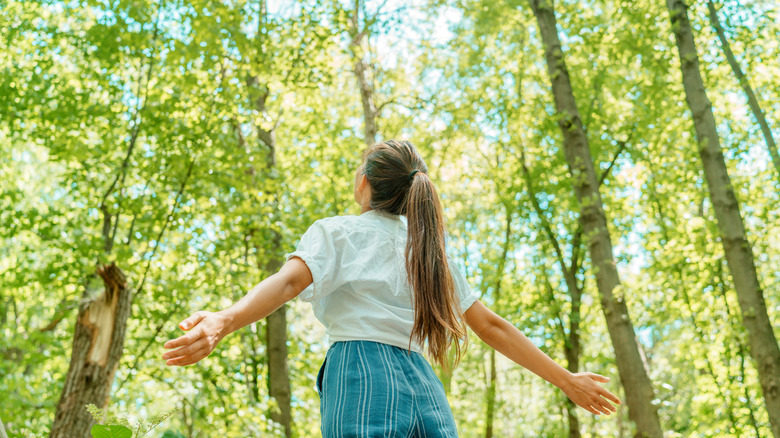Is There A Link Between Spending Time Outdoors And Your Well-Being?
The link between nature and well-being may be more significant than previously thought, according to a recent meta-review published in the journal ScienceAdvances. Researchers reviewed more than 300 scientific papers on cultural ecosystem services — nature's non-material contributions to human well-being — to assess the connection between these intangible contributions and various aspects of mental health and well-being (via Inverse). In their assessment, they identified more than 200 unique pathways between cultural ecosystem services and well-being.
Researchers were then able to narrow this number down to 68 pathways, 45 of which were found to positively impact human well-being. A total of 23 were found to negatively impact overall health and well-being. In the review, scientists also identified four different ways through which humans interact with nature: cultural practices, intellectual practices, spiritual practices, and form. Cultural practices refer to exercise and gathering plants, and intellectual practices refer to outdoor activities that allow one to gain new knowledge. Meanwhile, spiritual practices describe religious activities, and form is a way of engaging with nature through physical actions.
How nature benefits mental health and well-being
According to Healthline, engaging in these types of outdoor activities can greatly benefit your mental state, overall health, and well-being. That's because nature's stimuli can trigger a physiological response. For instance, previous research has shown that spending time outdoors immersed in nature can reduce your heart rate and blood pressure, and even help relieve muscle tension. "There can also be a level of psychological restoration, with the lowering of cortisol, improved concentration, and feeling a deeper sense of connection," environmental psychologist Lee Chambers told Healthline.
Some of these psychological benefits include lower stress levels, reduced anxiety and depression, and improved confidence and self-esteem. In order to reap these benefits, however, experts recommend spending at least two hours a week or 20 minutes a day outside. This should have a substantial and positive impact on your mental health and well-being. According to Chambers, the best way to increase the amount of time you spend outdoors is to take up a new hobby, like gardening, birdwatching, or going for a run.


